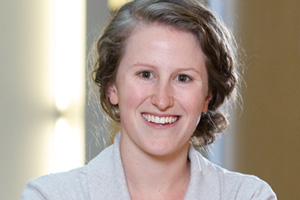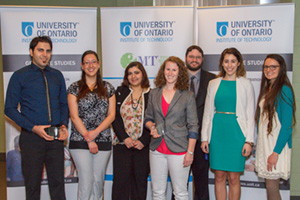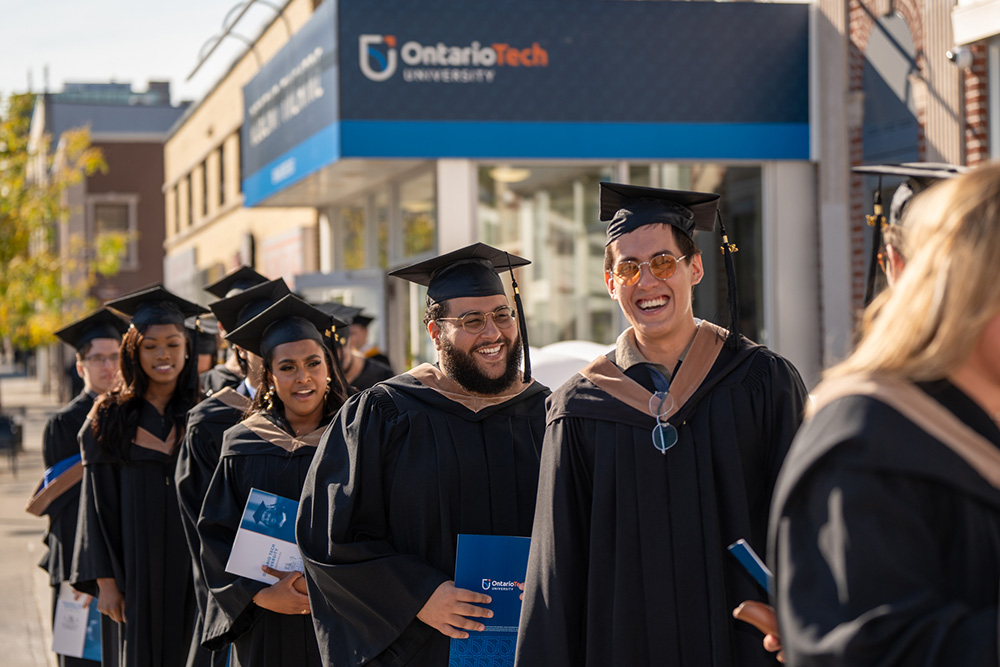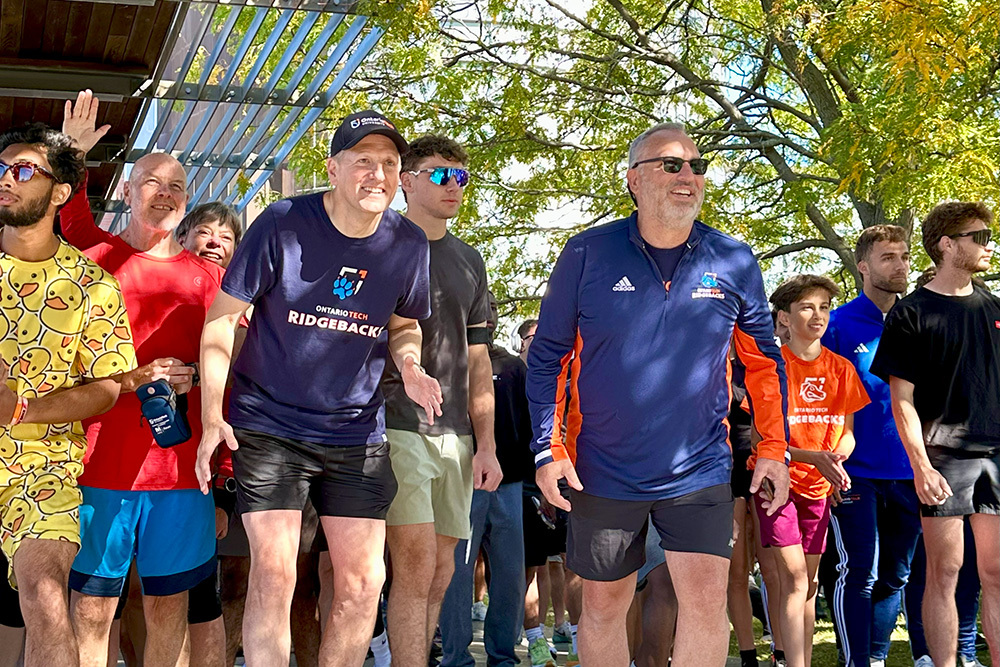UOIT Graduate Studies holds second-annual Three Minute Thesis Competition
April 25, 2014

Graduate students at the University of Ontario Institute of Technology (UOIT) were challenged to highlight their research during the university’s second-annual Three Minute Thesis competition (3MT®), hosted by the Office of Graduate Studies on April 9.
Dr. Brian Campbell, Associate Provost and Dean of Graduate Studies, said that at the university level, students and faculty often communicate using technical terms. “However, there are many situations where graduate students need to explain themselves to others - for example, filling out a grant application, filing a report, applying for jobs, explaining oneself to non-technical audiences or presenting to clients and the public," he said. "These are very critical skills. To get out there and explain your research within a very short time is an essential professional skill that is fostered by the Three Minute Thesis competition."
Graduate students were asked to present their research within the three-minute time frame clearly and concisely to a panel of non-academic judges from the public and private sector. There were seven finalists at the university’s finale.
Emily Bremer, a Master of Health Sciences student, took home first place. She presented her thesis, Investigating the Effectiveness of a Fundamental Motor Skill Intervention for Four-Year-Old Children with Autism Spectrum Disorder (supervised by Dr. Meghann Lloyd, Faculty of Health Sciences). Bremer represented UOIT at the provincial competition held at McMaster University in Hamilton, Ontario on April 24.
Second place went to Ashkan Kiani, Master of Applied Science in Electrical and Computer Engineering student, who presented his thesis, Application of Digital Signal Processing in Noise Removal and Extracting Fetal Electrocardiogram (supervised by Dr. Shahram ShahbazPanahi, Faculty of Engineering and Applied Science). Kiani also won the People's Choice award.
"[3MT® is] a great opportunity for anyone in graduate school," said Bremer. "It gives you a really good opportunity to practice your presentation skills. It's also a good skill to be able to crunch down two or four years of work into those three minutes and make it easy to understand. I think anyone in graduate school should definitely look into doing it."

Having started at the University of Queensland in 2008, 3MT® quickly spread to other Australian and New Zealand universities, and in 2010 the first Trans-Tasman competition was held. It has since spread across the globe to Vancouver, British Columbia; Tokyo, Japan; London and Edinburgh, UK; and Vienna, Austria. In 2011, the University of British Columbia held the first competition in Canada. Queen’s University in Kingston, Ontario and Western University in London, Ontario followed suit in 2012, challenging other Ontario universities to join in a provincewide competition. Sixteen Ontario universities sent representatives to the inaugural Ontario competition at Queen's University in 2013. After the 2014 provincial competition at McMaster University on April 24, there will be national 3MT® competitions in English and French in May 2014.
"I'll keep practicing and represent the University of Ontario Institute of Technology the best I can," promised Bremer.
Five additional graduate students took part in the UOIT 3MT® final:
- Nicholas Charabaruk, Master of Applied Science in Mechanical Engineering student. Thesis title: Autonomous Navigation of an Omnidirectional Hazardous Material Handling Robot. Supervised by Dr. Scott Nokleby, Faculty of Engineering and Applied Science.
- Rachel Goldgrub, Master of Health Sciences student. Thesis title: The Effectiveness of Multimodal Care for the Management of Patients Diagnosed with Soft Tissue Shoulder Disorders: A Systematic Review of the Literature. Supervised by Dr. Pierre Côté, Faculty of Health Sciences.
- Allison Gray, Master of Arts in Criminology student. Thesis title: Milking Anomie: Experiencing Food Safety Responsibility on Canadian Dairy Farms. Supervised by Dr. Ron Hinch, Faculty of Social Sciences and Humanities.
- Stephanie Mavilla, Master of Science in Materials Science student. Thesis title: Non-precious Metal Catalysts Prepared by Chemical Functionalization of Carbon Surfaces. Supervised by Dr. Brad Easton, Faculty of Science.
- Rina Wehbe, Master of Science in Computer Science student. Thesis title: Evaluating Social and Cognitive Effects of Video Games using Electroencephalography. Supervised by Dr. Lennart Nacke, Faculty of Business and Information Technology.
On hand to judge the presentations were seven prominent citizens from Durham Region:
- Dan Carter, professional speaker, TV broadcaster and author
- Dennis Croft, Executive Director, Spark Centre
- Ben Earle, Executive Director, Community Development Council Durham
- Darren Levine, Manager, Research and Innovation, Social Services Department, Regional Municipality of Durham
- Kathy McKay, Executive Director, Ajax-Pickering Board of Trade
- Kevin O'Neill, Chief Operating Officer, 360 Initiatives
- Joan Wideman, Vice-President, Corporate Services, Lenbrook Group of Companies



